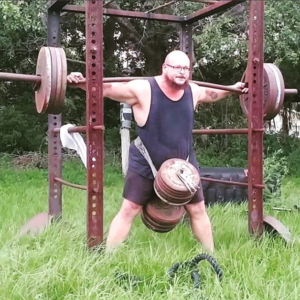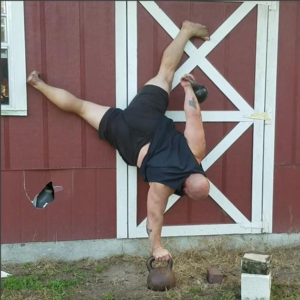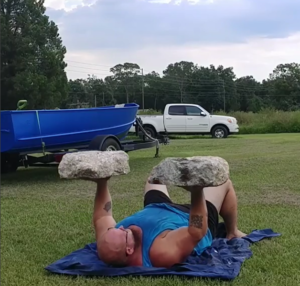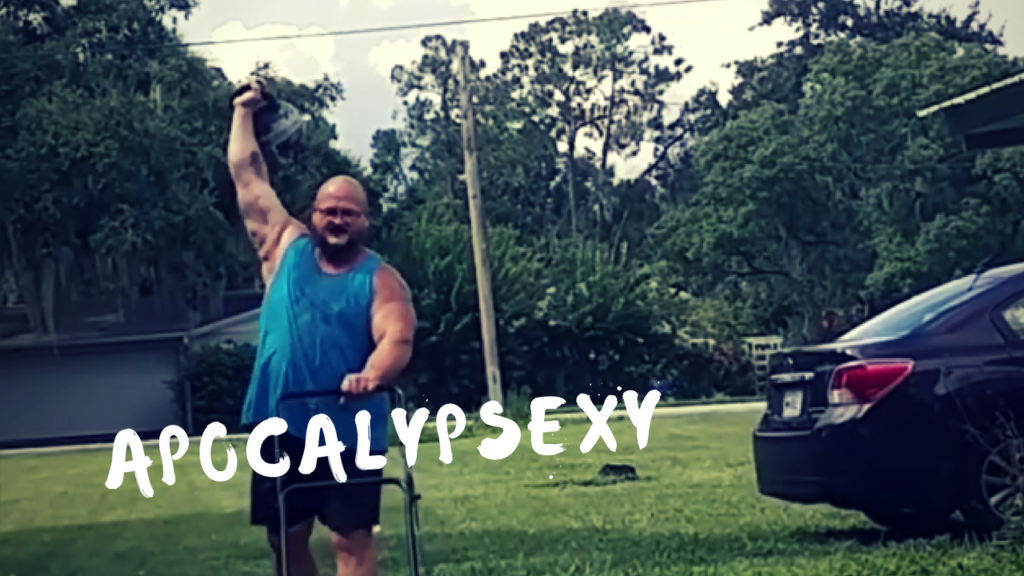Bud Jeffries is one of the most accomplished, yet controversial figures in strength sports today. As a performing strongman, he’s got to be ready to go any time he’s called on. Beyond that, Bud proudly lives what he calls the unconventional life, refusing to limit himself to anyone else’s idea of how to train. If you follow him for any length of time on Instagram as I do, you’ll see him boldly challenging any and all of his critics to match any of his feats or else be quiet. I had the chance to catch up to him to find out about his no rules training style and why he trains at home.
Best Lifts
Bud thanks for this interview. You’re an extremely accomplished strength athlete. I don’t even have space to write down all of it. Let’s start off by talking about some of your best lifts.
It all depends on how you quantify all of that stuff. I used to compete in powerlifting all of the time and then I kind of quit and went off on my own and that’s when all of my best lifts happened. And I’ll tell you why. I believe I stopped living under somebody else’s idea of what was the right way and started working what the right way for my body was.
Squat
The types of squats I do are Anderson Squats, parallel start, bottom position start. My best ever is 1,000lbs.
Yeah, I know you have something out saying you offered $1,000 to anybody who could equal it?
Yeah, years ago I offered $1,000 to anybody on the planet who could beat that lift and take a drug test. So nobody answered.
I was going to say that you still have your money as far as I know.
Yeah, nobody answered; nobody tried. One guy was pretty close; I have no idea about the drug thing. And really that doesn’t matter to me that much but if we’re going to be straight about everything; it is what it is.
What’s your best powerlifting competition squat?
About 800lbs. Actually I did about 850 walked out in a gym. I did 850 four days in a row, walked out in a gym. I wanted to experiment with different frequencies, trying to really see what the difference in effect it had on the body.
Bench
My best ever bench in a gym is 500
Deadlift
my best ever deadlift is 705lbs.
Overhead Press
I did 350lbs from a dead stop seated. Starting at below my chin. I’ve also done between 200-220 one armed with a dumbbell, with a pair of stacked kettlebells or with a stone.
 That’s the thing when you have someone is a performing strongman and you ask him what his best lifts are! Because you do so many things it’s not like you’re a single lift athlete.
That’s the thing when you have someone is a performing strongman and you ask him what his best lifts are! Because you do so many things it’s not like you’re a single lift athlete.
And there’s the thing, I wanted to get away from being a specialist. You know what I’m saying? In some ways you can look at is as I am a specialist; I am a strength specialist but I wanted to have an extremely wide variety of strength. Because I think one of the mistakes we make in modern lifting is we’re very narrow in our scope of things. Listen man, there’s a million legitimate ways to squat, to deadlift, to bench press, to press overhead, to pull things—there’s a lot of ways to be strong. One is not better than the other. It’s just what you want to do. What do you feel like doing? And within that you open up the framework to say, Okay, this really fits my body and this doesn’t leave me hurting. Which is two big questions to answer. So if I told you there’s only one way to squat, press, pull whatever—that’s the only legitimate way but that way doesn’t fit your body and it leaves you with destroyed knees or a hurt back or torn up shoulders but you could be legitimately strong in ways that don’t damage you; that you have fun with, that work in the real world and don’t leave you hurt; why wouldn’t you train that way? We try to make it like one of these ways is the king of the lifts. Listen that’s baloney. There’s a million ways to do it.
That’s one of the things I want to touch on a little bit before we go on. Zach Even Esh is someone I follow and he’s big on preparing for anything. Now you can’t really prepare for everything but it seems like training the way you do means if there was a powerlifting meet; squat, bench, deadlift, you could say, “Yeah, I’ll enter that” but you wouldn’t necessarily need to meet prep for it. You could just be like, “It’s this Saturday? Okay, I can do it.”
I mean I can walk up and do that with no problem. Now here’s the thing: I can walk in and do it this Saturday and you total whatever you total. Now you give me three weeks to practice the competition style; that would be an extra hundred pounds or more on the total. You give me six months—it’s a progression of how prepared I’d be. Now I can still walk in and give a very decent total; it’s a question of specific preparedness versus general preparedness. I’m just a bigger believer in general preparedness unless you’re trying for one specific thing and willing to try that at the cost of everything else or at the minimal importance of other things
Training Philosophy
I have a very specific set of basics that I practice all of the time. Because I believe that’s when you are the most generally prepared. I don’t necessarily do the competition style but I always do some kind of squat, some kind of press, some kind of pull, some kind of balance movement, some kind of stone or odd object lifting, carrying, some kind of endurance movement and then some kind of agility based movement. Because I think those are the big things. If you can move well, if you can lift things in all the major physical movements, if you can pick up and carry lots of things. If you can balance, if your endurance is good, you’re pretty well physically prepared to walk in and say, do a powerlifting meet or do a Spartan Race or whatever.
style but I always do some kind of squat, some kind of press, some kind of pull, some kind of balance movement, some kind of stone or odd object lifting, carrying, some kind of endurance movement and then some kind of agility based movement. Because I think those are the big things. If you can move well, if you can lift things in all the major physical movements, if you can pick up and carry lots of things. If you can balance, if your endurance is good, you’re pretty well physically prepared to walk in and say, do a powerlifting meet or do a Spartan Race or whatever.
What is the hardest thing that you’ve ever tried to do and failed at and how did you handle failure?
Terribly ha ha!
Because the first time you squatted, you got mashed to the floor but didn’t quit. You got hit by a car and didn’t quit.
I usually handle it by repeating it over and over again until I don’t fail. First time I squatted 900lbs it took me four tries and I passed out on the second try! And here’s the thing about having a long term career sometimes we try things and it doesn’t go that day and we quit but I’m going to stick with it and try most things until I’m going to succeed. Now don’t get me wrong, I’ve built a lot of calm but I’ve also got a lot of rowdy that’s just sort sitting inside me. So if you see me miss a lift you may well see me jump up and down for a second and yell and scream. Scott Weech’s one of the strongest powerlifters in the world but Scott’s a very calm human being. Scott misses a lift and it looks like he spilled his tea! It’s a difference in emotional makeup or whatever. I’m very invested in the things I do to the point that I really, really want to do them. The hardest one I haven’t succeeded at I don’t know.
So maybe in your mind it’s you haven’t succeeded yet?
Absolutely.
I think that comes from your performing strongman background because I watched Bending Steel and Chris Schoek worked on that bar for months. I wrote an article about how the definition of work out used to mean it’s a problem to solve. Like working out a problem on the blackboard, a strongman is trying to figure out how to do x, y or z. And I guess when you look at it from that perspective failing now just means that’s not how to do it and I just need to figure out how to do it.
the definition of work out used to mean it’s a problem to solve. Like working out a problem on the blackboard, a strongman is trying to figure out how to do x, y or z. And I guess when you look at it from that perspective failing now just means that’s not how to do it and I just need to figure out how to do it.
Absolutely and many of these things, they take months! Months if not years. It took me sixteen years to squat 1,000lbs. Sixteen years of training, it took me nine months to do a triple clap push up and a triple clap one armed pushup. Took me months and months and months to get them done. Took me months to be able to do a thousand swings in a workout. This is long term. In the first meet I went to I set four state records and I had a little interview in the local newspaper. I was fourteen so it was a big deal. The guy who was coaching me at the time who was one of the powerlifters who I started with said, “He’s done a very good job and now we’ll see what happens in the next ten or twenty years because that’s the game of strength it’s a long term progression.” And now I see it’s even longer, especially when I go out to see what there really is to explore, what there really is to try. There’s literally a lifetime, you could go a lifetime and still barely explore all of the ways that there are to be strong.
You train in your backyard like the legendary Paul Anderson. Is it because you simply have more freedom to train how you want or do you just like scaring your neighbors?
We talked about being ready for anything? So being ready for anything I also think is being outside. It’s being ready to function in different temperatures, different environments, different stimulus; I like to be outside. I think the oxygen is better, your connection to the ground and all of the health benefits is better. Also nobody’s in my way. I don’t have to wait for a pec deck. And because so much of my routine is experimental and super fast paced that most of my work is some combination of cardio and strength together so like I’m literally moving in a no rest fashion which is very hard to do in most gyms. Most people don’t have rocks to play with and they’re not going to let me light barbells on fire. I have so much more freedom here.
How can people get in touch with you if they want to purchase your products or find out more about your training?
They can go to my website: anunconventionallife.com and they can always catch me on Facebook, Instagram, Twitter under my name Bud Jeffries and there’s links to everything. If it’s crazy we’ve got a video to show you how to do it!

